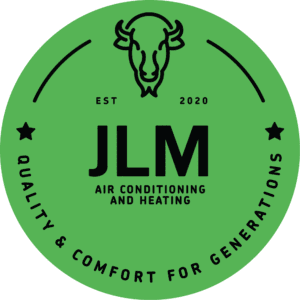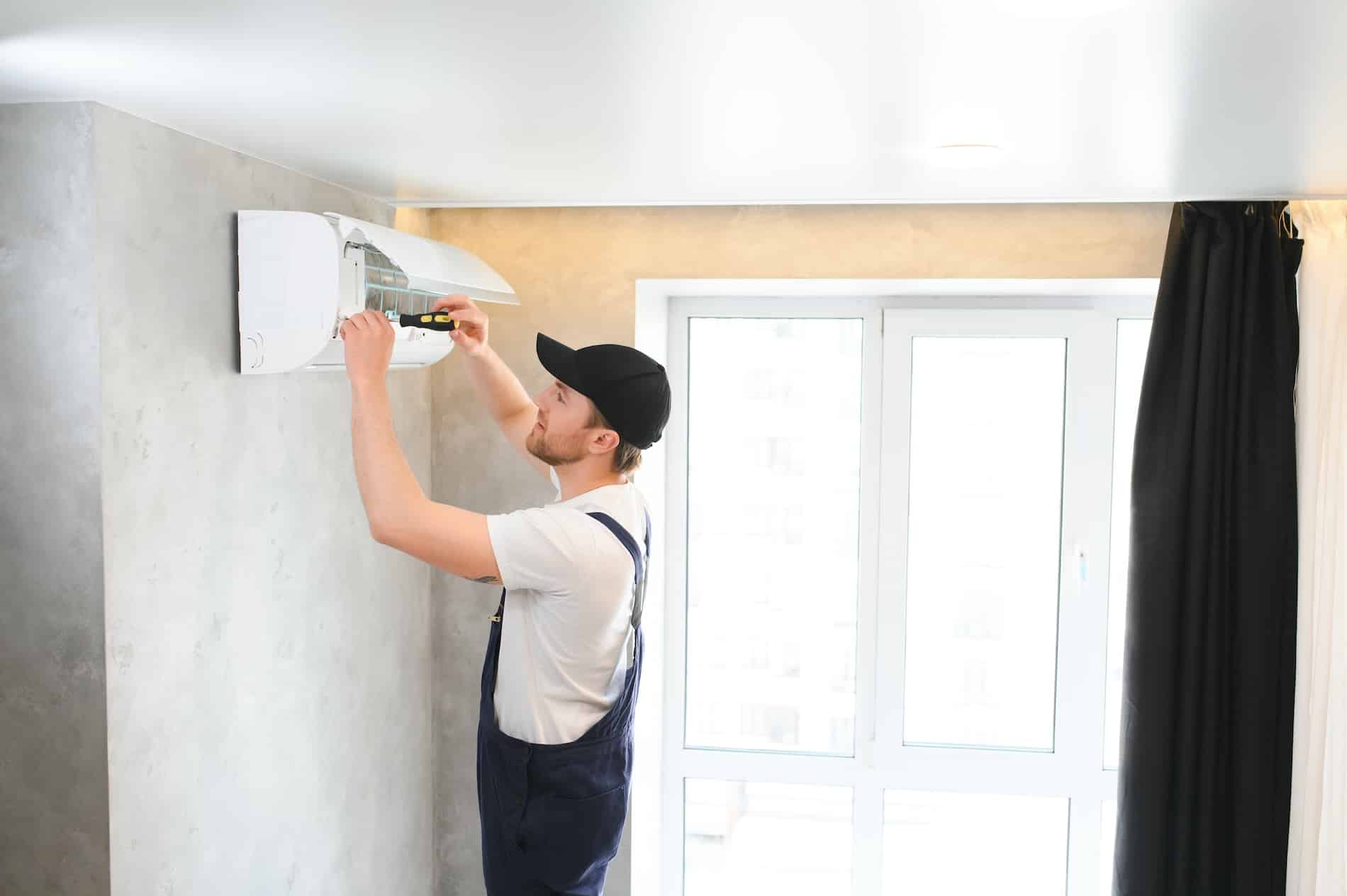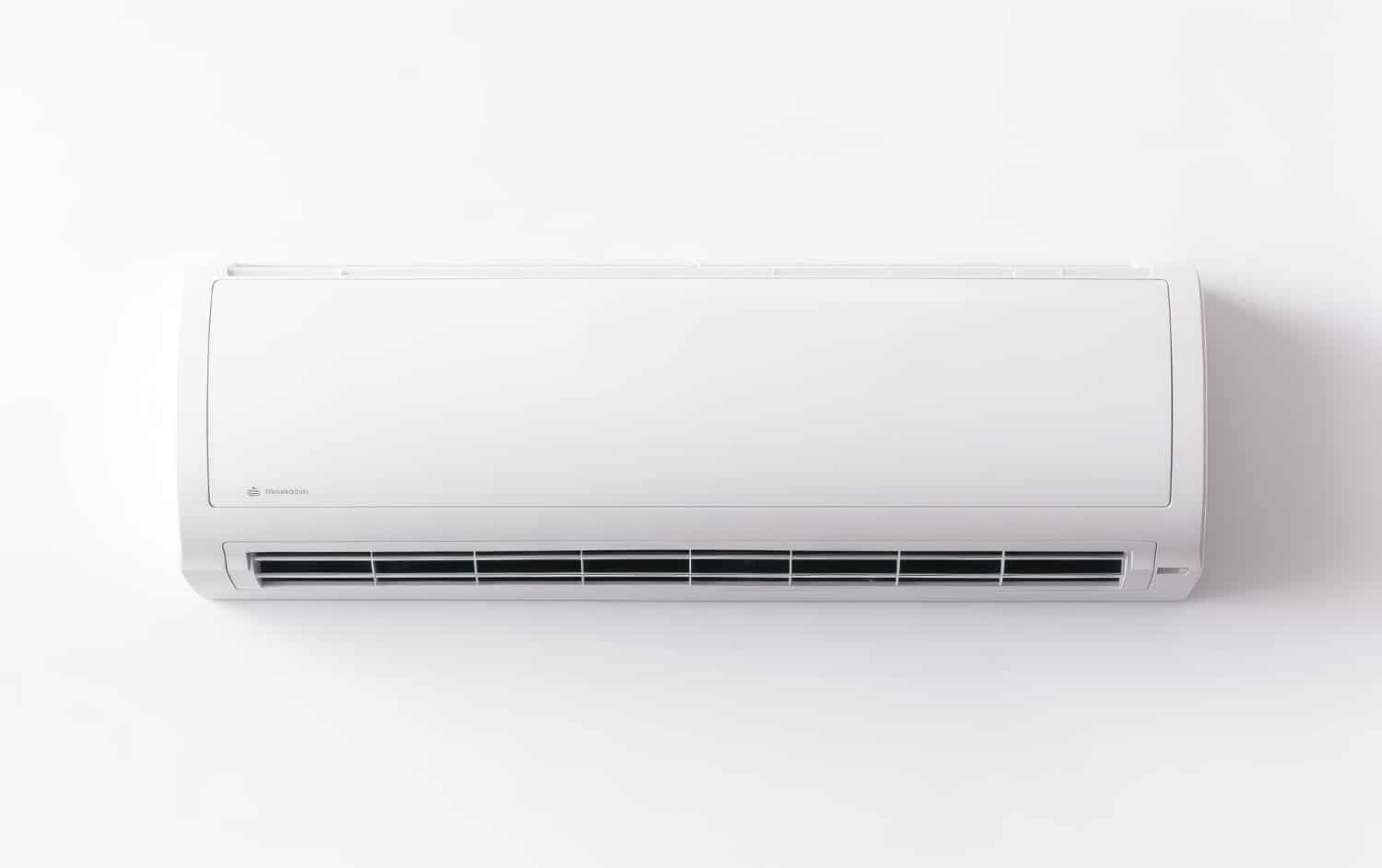Heating, Ventilation and Air Conditioning the most essential elements to keep the temperature regular. Isn’t that so? Well. what happens when your HVAC system altogether breaks down? REAPIR TIME! That’s right! Well don’t sweat people, cause it’s time for you to finally list down the crucial factors that go into the repair cost; the most important being the cost; as you might’ve already guessed it. Forecasting HVAC maintenance costs helps you budget. Cost depends on repair type, labor, and parts. Major repairs like compressor replacement are more expensive than minor ones like thermostat issues. Prevent costly breakdowns with regular maintenance. If your system is broken, fix it soon away to save money. Knowing HVAC repair prices helps you budget and avoid surprises. So, let’s break it down step by step and list down all the cost affair!
What’s a HVAC System?
Before we go into the cost and pricing details we must know in depth what a HVAC is. So, an HVAC system (Heating, Ventilation, and Air Conditioning) controls indoor temperature, air quality, and humidity. It includes a heat pump, furnace, air conditioner, ductwork, and thermostats. These systems operate efficiently when maintained properly, helping reduce energy consumption and ensuring a comfortable indoor environment.
Key Aspects of an HVAC System
- HVAC maintenance is essential for preventing costly repairs and extending the system’s lifespan. Regular servicing helps maintain efficiency.
- Repairs cost varies based on the issue, required parts, and labor rates in your area. Minor fixes may cost a few hundred dollars, while major repairs can exceed $1,000.
- The cost of replacing an HVAC system depends on the unit size, efficiency rating, and additional features. A high-efficiency system costs more but saves on energy bills.
- Average costs for HVAC replacement range from $5,000 to $12,000, with premium models reaching $15,000 or more.
- Labor costs play a significant role in installation expenses. Skilled HVAC technicians charge higher rates but ensure proper installation.
- A heat pump offers both heating and cooling, making it a versatile and energy-efficient choice for many homes.
- A professional HVAC technician is necessary for proper installation, troubleshooting, and repairs.
Routine HVAC maintenance reduces repairs cost, keeps the system operating efficiently, and prevents unexpected breakdowns. Investing in regular servicing helps homeowners avoid high labor costs and ensures their HVAC system runs smoothly for years.
Average Costs for Common HVAC Repair
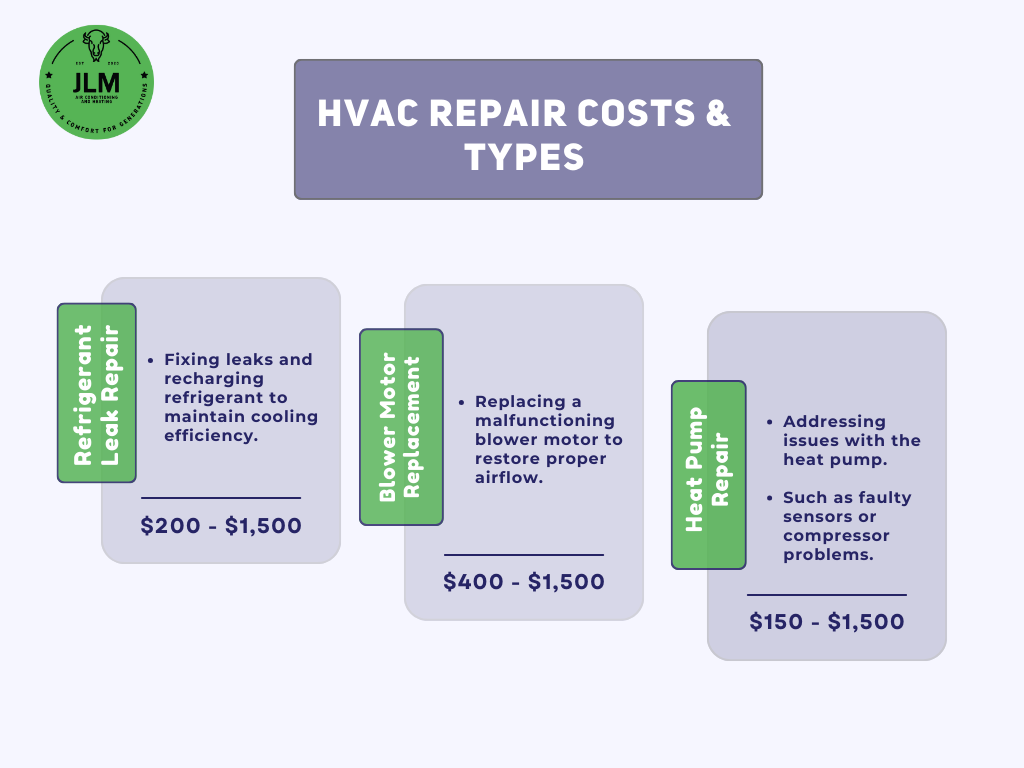
Finally, here we are with the costs! The repairs cost for an HVAC system depends on the type of issue, part availability, and labor rates in your area. Regular HVAC maintenance helps prevent expensive repairs, but even well-maintained systems can experience failures. Below are the average costs for common HVAC system repairs, including major components like the heat pump, compressor, and blower motor.
Thermostat Repair or Replacement
- Repairs cost: $150 to $1,500
- A faulty thermostat can prevent your HVAC system from heating or cooling properly.
- Simple recalibration costs less, while upgrading to a smart thermostat increases the cost of replacing this component.
- Professional installation by an HVAC technician ensures proper wiring and functionality.
Refrigerant Leak Repair
- Repairs cost: $200 to $1,500
- Refrigerant is crucial for cooling, and leaks cause the system to overwork, reducing efficiency.
- Fixing leaks involves finding the source, sealing it, and refilling the refrigerant.
- Some refrigerants are expensive or phased out, increasing the cost of replacing old systems.
Heat Pump Repair
- Repairs cost: $150 to $4,000
- A heat pump provides both heating and cooling, but issues like refrigerant leaks, electrical failures, or compressor damage require professional service.
- Simple fixes, such as replacing a capacitor, cost less, while major repairs like a compressor replacement are more expensive.
- Proper HVAC maintenance helps a heat pump operate efficiently and extends its lifespan.
Blower Motor Repair or Replacement
- Repairs cost: $300 to $1,500
- The blower motor pushes air through ducts, and failure results in weak airflow or no heating/cooling.
- Cleaning and lubricating the motor during HVAC maintenance can prevent failure.
- If the motor burns out, the cost of replacing it depends on the system type and labor costs.
Compressor Repair or Replacement
- Repairs cost: $1,500 to $4,000
- The compressor is a vital part of the HVAC system, and failure often requires full HVAC replacement.
- Replacing a compressor is costly due to high labor rates and expensive parts.
- If a system is over 10-15 years old, the cost of replacing the entire unit may be more cost-effective.
Evaporator and Condenser Coil Repairs
- Repairs cost: $600 to $2,500
- Dirty or damaged coils reduce efficiency, making the system struggle to operate efficiently.
- Cleaning coils during routine HVAC maintenance helps prevent costly damage.
- If corrosion occurs, the cost of replacing coils is significant, sometimes leading to HVAC replacement.
Ductwork Repair and Sealing
- Repairs cost: $500 to $2,000
- Leaky ducts reduce efficiency and increase energy bills.
- Repairing or sealing ducts improves airflow and helps the HVAC system operate efficiently.
- Extensive duct damage may require full replacement, raising labor costs.
Factors That Affect HVAC Repair Costs
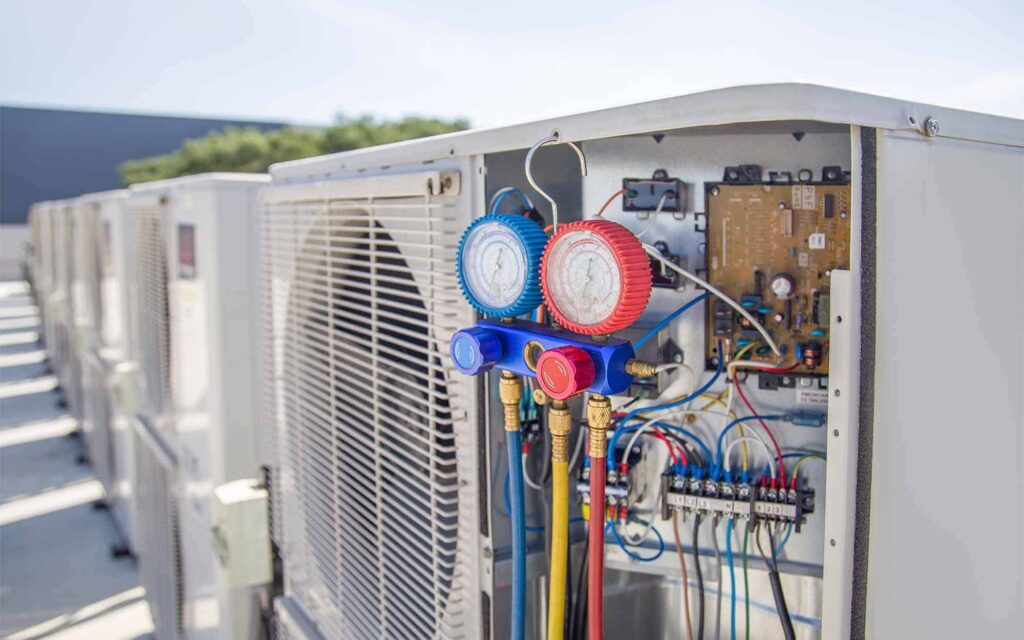
Credit: suihvac.com
People, let us now get a hint of all the factors that affect the repair cost for an HVAC system depends on several factors, including the type of repair, labor rates, system age, and part availability. Understanding these factors helps homeowners estimate potential expenses and plan for maintenance.
1. Type of Repair
- Minor fixes, such as replacing a thermostat or capacitor, cost less than major component failures.
- Repairs for a heat pump, compressor, or refrigerant leak can be expensive due to specialized labor.
- Emergency repairs may cost more, especially after hours or during peak seasons.
2. HVAC System Age
- Older systems require more frequent repairs, increasing repairs cost over time.
- Finding replacement parts for outdated units can be difficult, raising overall expenses.
- Systems over 15 years old may require HVAC replacement rather than repairs.
3. Labor Costs and Rates
- Labor costs vary based on location, contractor experience, and job complexity.
- Higher labor rates apply for emergency services, weekend calls, or difficult installations.
- A licensed HVAC technician may charge more but ensures quality workmanship.
4. Parts and Component Availability
- Some HVAC components are readily available, while others, like heat exchangers or blower motors, may have long wait times.
- Rare or discontinued parts increase the cost of replacing broken components.
- Premium brands may have higher-priced replacement parts.
5. System Efficiency and Maintenance History
- Well-maintained systems operate efficiently and experience fewer breakdowns.
- Neglecting HVAC maintenance leads to higher repairs cost due to worn-out parts.
- Dirty filters, clogged coils, or refrigerant leaks strain the system, requiring costly fixes.
6. Seasonal Demand and Service Timing
- Repair costs rise during peak seasons, such as summer (for AC repairs) and winter (for heating issues).
- Scheduling routine HVAC maintenance in off-peak months can lower repairs cost and prevent major failures.
7. Extent of the Damage
- A minor issue caught early costs less to fix than a full system breakdown.
- If damage affects multiple components, homeowners may face high HVAC replacement expenses.
- A failing heat pump, refrigerant leak, or electrical issue can significantly raise repair bills.
How to Reduce HVAC Repair Costs?
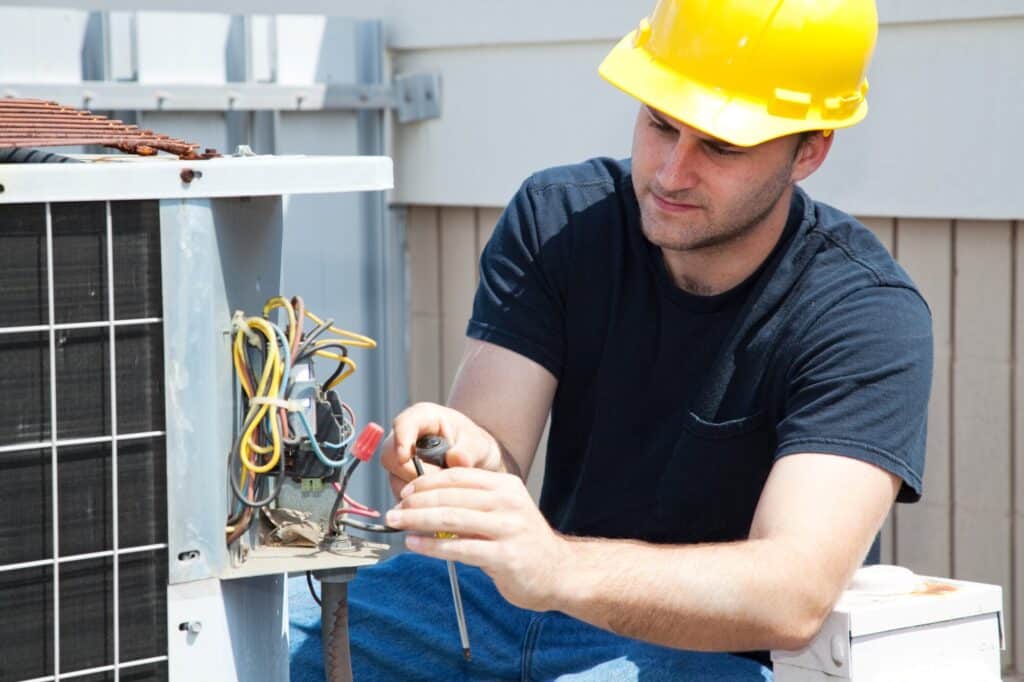
Credit: austingsmechanical.com
Want to manage your budget with the HVAC repairs? While HVAC repairs are sometimes unavoidable, proactive steps can help lower repairs cost and extend the life of your HVAC system. Regular upkeep ensures your system continues to operate efficiently, reducing the risk of expensive breakdowns. Below are key strategies to minimize repair expenses and keep your system running smoothly.
i.Schedule Regular HVAC Maintenance
- Routine HVAC maintenance helps prevent costly repairs by catching small issues before they worsen.
- A professional HVAC technician can inspect key components, clean coils, check refrigerant levels, and ensure the system operates efficiently.
- Skipping maintenance can lead to clogged filters, overheating, and reduced system performance, increasing repairs cost over time.
ii.Change Filters Regularly
- A clogged air filter forces your HVAC system to work harder, leading to unnecessary strain on the motor and blower.
- Dirty filters reduce airflow, making it difficult for the system to operate efficiently, resulting in higher energy bills and potential damage.
- Replace filters every 1-3 months, depending on usage and air quality, to lower labor costs and prevent frequent repairs.
iii.Address Small Issues Early
- Minor problems, such as weak airflow, strange noises, or fluctuating temperatures, often signal larger issues.
- Ignoring these signs can lead to expensive component failures, such as compressor or heat pump malfunctions, increasing the cost of replacing parts.
- Contacting an HVAC technician promptly helps prevent major damage and reduces overall repairs cost.
iv.Shop Around for Quotes
- Repair costs vary depending on the contractor, labor rates, and service fees.
- Before committing to a repair, compare estimates from multiple providers to find the best pricing and service quality.
- Be cautious of extremely low quotes, as they may indicate inexperienced technicians or hidden fees that raise the final labor costs.
v.Consider a Service Plan
- Many HVAC companies offer HVAC maintenance plans that provide routine check-ups and priority service at a discounted rate.
- These plans often include filter replacements, system tune-ups, and reduced repairs cost for unexpected breakdowns.
- Investing in a service plan can extend the life of your system, delay HVAC replacement, and help it operate efficiently year-round.
When to Consider HVAC Replacement?
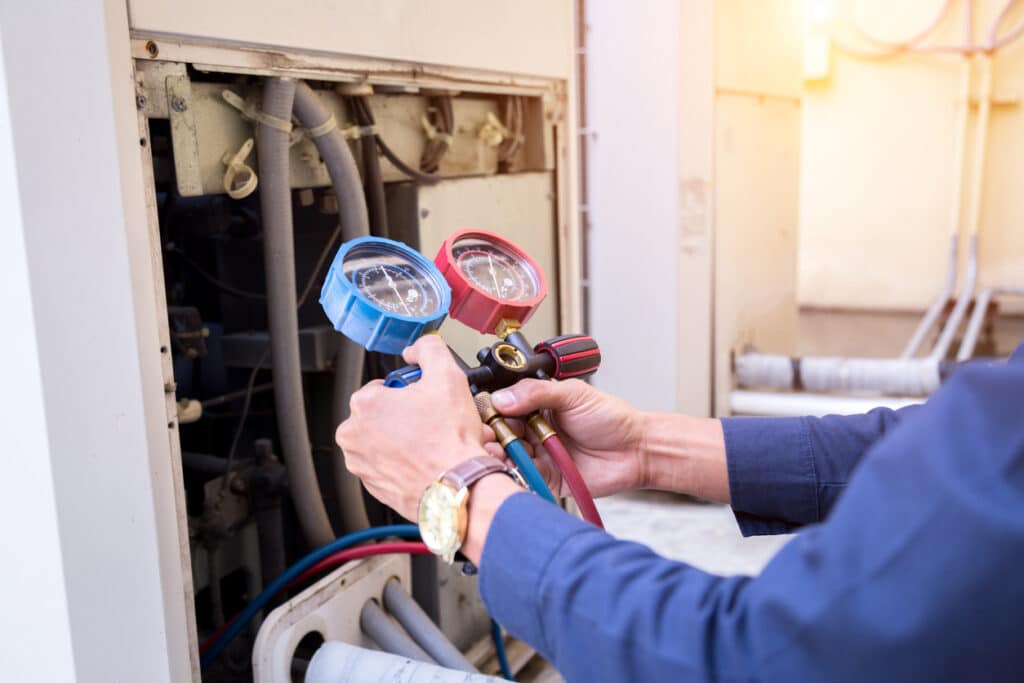
Credit: pinnaclehvac.com
So, when it’s finally time for you to replace your HVAC system? While regular HVAC maintenance and timely repairs can keep your system running for years, there comes a point when continuing to fix an old unit is no longer cost-effective. A full HVAC replacement may be the better long-term solution, especially if your current system struggles to operate efficiently or needs frequent repairs. Below are key signs that indicate it’s time to invest in a new HVAC system.
Your HVAC System Is Over 15 Years Old
- Most HVAC systems have a lifespan of 10–15 years with proper care.
- As systems age, components wear out, making them less efficient and more prone to breakdowns.
- Even with regular HVAC maintenance, an aging unit will eventually struggle to operate efficiently, leading to higher energy bills and inconsistent performance.
- If your system is approaching or exceeding this age range, consider the cost of replacing it rather than continuing costly repairs.
Frequent and Costly Repairs
- If you constantly need an HVAC technician to fix different components, your repairs cost can quickly add up.
- Major parts like the heat pump, blower motor, or compressor are expensive to repair, and repeated failures indicate a failing system.
- When the total repairs cost over a short period approaches half the price of a new unit, HVAC replacement becomes the smarter financial decision.
Rising Energy Bills
- As an HVAC system ages, it loses efficiency, forcing it to work harder to maintain comfortable temperatures.
- Increased strain leads to higher energy consumption, making utility bills climb month after month.
- Newer units use advanced technology, such as variable-speed motors and high-efficiency heat pumps, allowing them to operate efficiently while lowering energy costs.
Uneven Heating and Cooling
- If some rooms in your home are too hot while others remain too cold, your HVAC system may be failing.
- Issues like duct leaks, failing compressors, or malfunctioning heat pumps can cause uneven temperatures.
- Even after servicing, if your system cannot distribute air properly, it may be time to consider an HVAC replacement.
Outdated Technology and Refrigerants
- Older HVAC systems often use outdated refrigerants, such as R-22, which has been phased out due to environmental concerns.
- The cost of replacing refrigerant in an old system is high, and finding compatible parts can be difficult.
- Newer models use eco-friendly refrigerants and smart technology to operate efficiently, reducing energy consumption and environmental impact.
Benefits of HVAC Replacement
Investing in a new HVAC system comes with several advantages, including:
- Improved Efficiency: New systems use advanced technology to lower energy consumption.
- Lower Long-Term Costs: While the upfront cost of replacing an HVAC unit may be high, reduced labor costs and energy savings make it worthwhile.
- Fewer Breakdowns: A modern unit requires fewer repairs, reducing unexpected repairs cost and labor rates.
- Enhanced Comfort: A new system ensures consistent heating and cooling throughout your home.
Folks, if nothing is working and you are not completely satisfied with your HVAC replacement and installation, it’s time to choose the most reliable JLM HVAC system repairs and upgrades. So, choose us without a second thought for the best services!
The Final Word
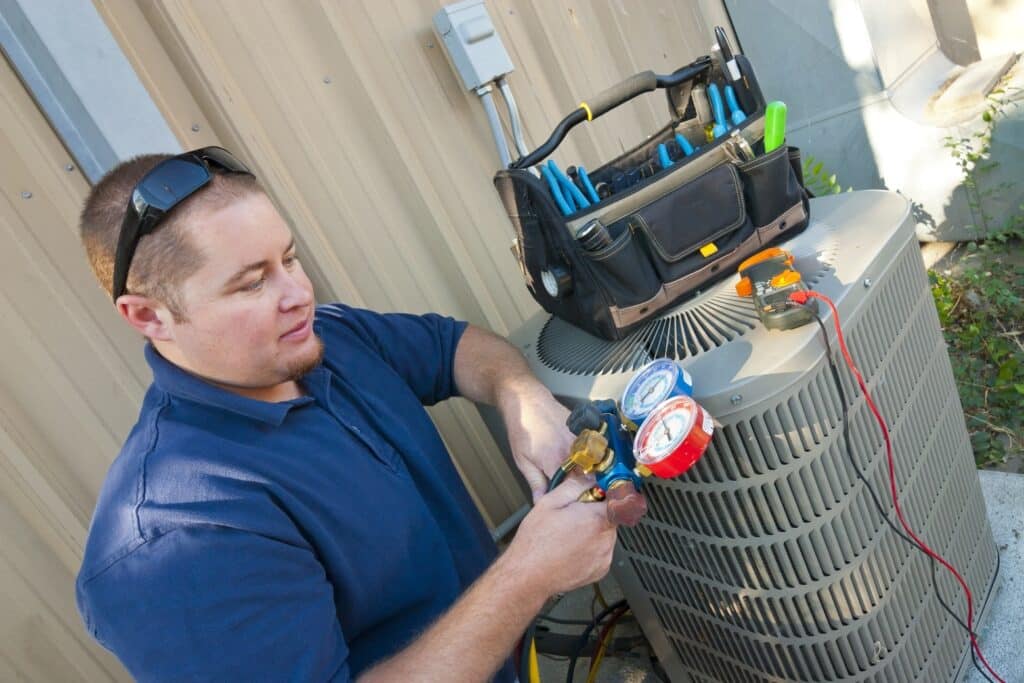
Credit: hvaccareermap.org
HVAC repair costs vary, but regular maintenance keeps your system running well. Understanding average HVAC costs is crucial for quick fixes or major replacements. Labor expenses and rates affect your price, especially for heat pump repairs or large part replacements. A qualified HVAC expert does outstanding work, but early repairs save money. Avoid surprise costs by planning, comparing rates, and maintaining your system. Stay informed to keep your house cozy year-round!
KEEP TRACK OF THE COST! 💰
